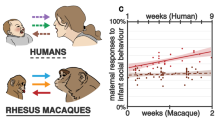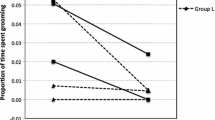Abstract
This study evaluated the effects of time of day, ambient temperature, and relative humidity on mother-infant interactions in captive Japanese macaques (Macaca fuscata). Unlike time of day and relative humidity, temperature influenced mother-infant interactions. Even though total time spent in ventroventral contact did not change, lower temperatures were associated with greater attempts by the infants to maintain contact with their mothers and with more frequent maternal rejection. Effects of temperature on mother-infant interactions were not mediated by the effects of temperature on mothers' general activity. These results are interpreted in light of the different thermoregulatory needs of mothers and infants, and highlight a previously neglected cause for mother-infant conflict.
Similar content being viewed by others
Author information
Authors and Affiliations
Additional information
Received: 23 June 1997 / Accepted after revision: 28 March 1998
Rights and permissions
About this article
Cite this article
Schino, G., Troisi, A. Mother-infant conflict over behavioral thermoregulation in Japanese macaques. Behav Ecol Sociobiol 43, 81–86 (1998). https://doi.org/10.1007/s002650050469
Issue Date:
DOI: https://doi.org/10.1007/s002650050469




